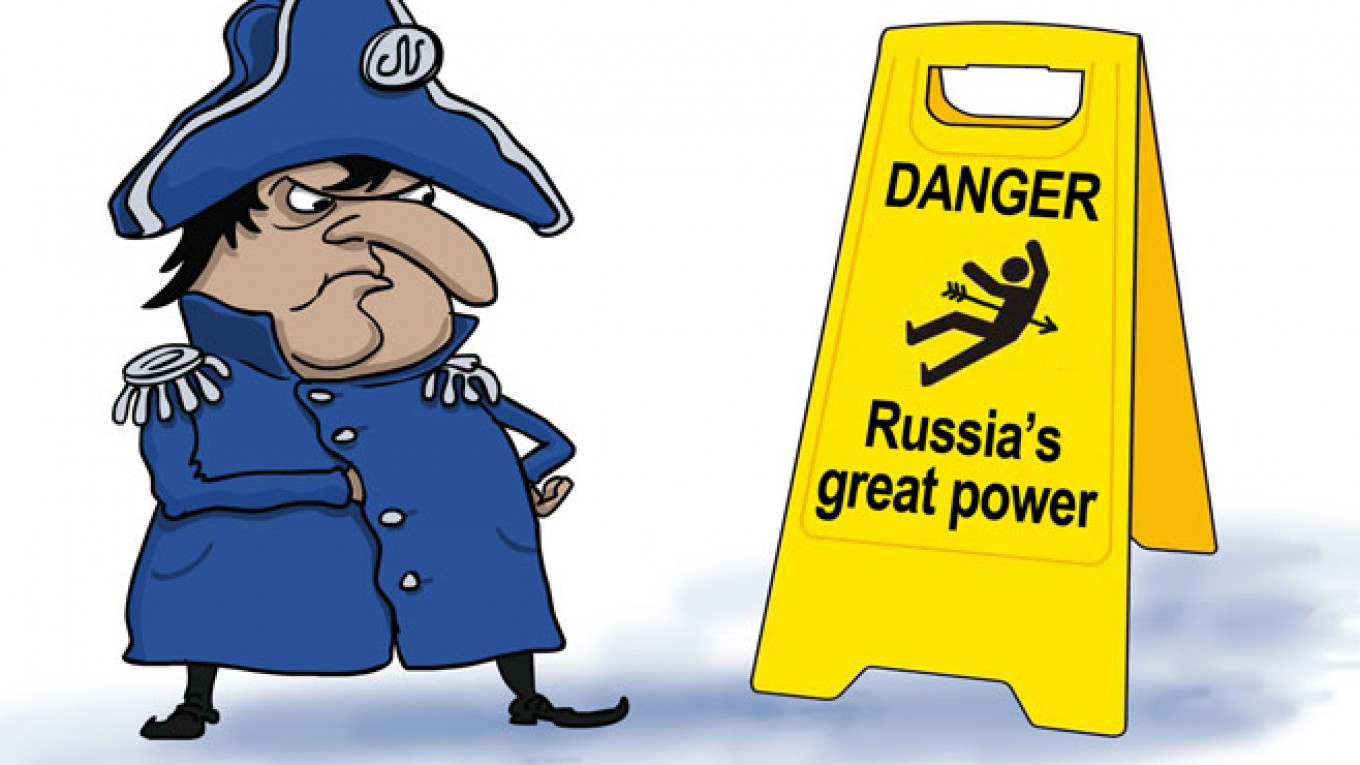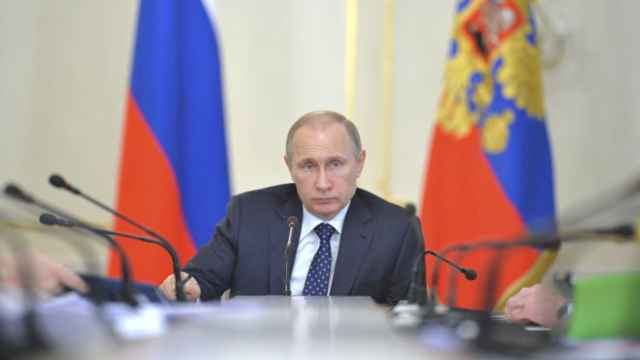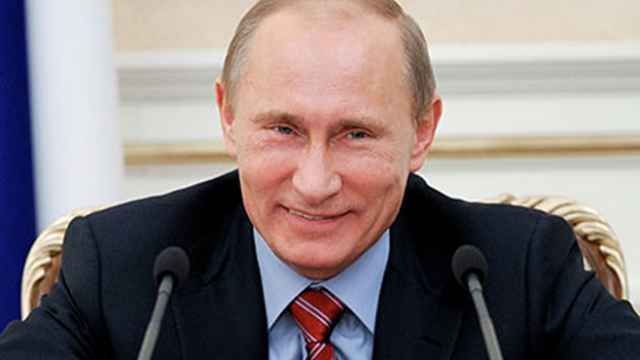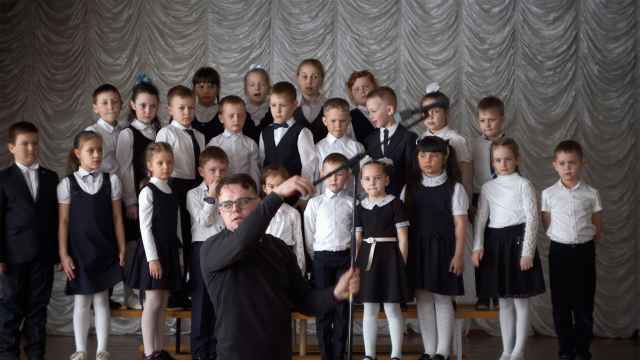Russians take pride in the fact that whenever Russia has experienced a severe blow to its ability to play the role of a great power in the past, it has been able to recover and re-emerge as one — often in a very short period of time.
Napoleon's invasion of Russia in 1812 was soon followed by Russia being part of the winning coalition that defeated him in 1814-15.
Germany forced Moscow to sign the humiliating treaty of Brest-Litovsk in 1918, which involved a great loss of territory for Russia but was soon followed by the Bolsheviks' consolidation of power and recapture of most of that territory.
The Nazi invasion of the Soviet Union in 1941 was followed by the Soviet Union being part of the winning coalition that defeated Germany in 1945 and the Soviet Union becoming one of the world's two superpowers afterward.
The collapse of the Soviet Union and subsequent economic chaos was followed by President Vladimir Putin restoring stability and prosperity and reasserting Russia's role as a great power internationally.
Putin, then, appears to conform to the pattern of Russian leaders who succeeded in reversing precipitate decline and reviving Russia, like the phoenix, as a great power.
There is, though, another way of viewing Russian history: Instead of seeing Russia as always being able to bounce back from near collapse, the pattern can also be seen as one in which despite Russia constantly building up its power and prestige, it always experiences catastrophic setbacks — much like Sisyphus' efforts to push a boulder up to the top of the hill always ending in futility.
Despite everything that the tsars did to advance Russia into the ranks of the European great powers, Russia was unable to avoid the disaster of being invaded by Napoleon.
Despite the promising political reforms of the early 20th century, Russia did not avoid the disasters of World War I, the Russian Revolution, and the Civil War
Despite the tremendous economic strides made under Stalin (albeit at enormous human cost), the Soviet Union experienced the catastrophe of the German invasion of 1941.
And despite the Soviet Union's achievement of superpower status after World War II, the Soviet Union collapsed in 1991 and Russia experienced severe economic decline.
All this raises the question: Will Putin's efforts aimed at reasserting Russia's role as a great power also end in yet another painful setback? Instead of another phoenix, will he prove to be another Sisyphus?
The answer depends on a determination about what has been the main cause of Russia's repeated setbacks.
Many Russians would point to foreign aggression or hostility as the cause of them. While there was no direct Soviet-American conflict during the Cold War, they see America's containment policy as having weakened the Soviet Union.
Russia's setbacks were caused by hostile foreigners, and its recoveries are the admirable result of Russian initiative.
But in three of Russia's most catastrophic setbacks, poor decisions made by Russian leaders — decisions that they did not have to make — played an important role in bringing them about.
Tsar Nicholas II did not have to decide to defend Serbia and enter World War I. If the war had remained limited to one between Austria-Hungary and Serbia, the increasingly vulnerable imperial government in Vienna may well have exhausted itself in a conflict with nationalist Serbia. The tsarist government, though, could have survived even in the unlikely event that Austria-Hungary quickly defeated Serbia, and avoided the far greater catastrophe of the Bolshevik Revolution.
Similarly, Stalin did not have to agree to the 1939 Nazi-Soviet Pact, which put Germany in a far better position to attack the Soviet Union in 1941. Stalin's extraordinary belief that Hitler would not attack the Soviet Union was a truly historic blunder.
And while Gorbachev was right in concluding that the Soviet Union needed sweeping economic reform in order to keep up with a strengthening West, he did not have to try to implement his utterly naive economic reform plans — especially when he could have just copied the successful model of market-based economic reform while maintaining political control that Deng Xiaoping had implemented in China.
Will Putin experience the same fate? He clearly seeks to reassert Russia's role as a great power. But it is not at all certain that the way he has chosen to do so will achieve that aim. He did not, after all, have to annex Crimea, get Russia involved in a prolonged conflict in eastern Ukraine or do anything else that has resulted in antagonizing the West — Russia's most likely ally against an increasingly powerful China, which has been more slowly but more successfully reasserting itself as a great power than Russia.
Instead of strengthening Russia, then, Putin's decisions may be similar to the avoidable ones made by Nicholas II, Stalin and Gorbachev that resulted in harming Russia.
Just like previous Russian rulers, then, what Putin may actually be doing is setting Russia up for yet another catastrophic setback.
Mark N. Katz is a professor of government and politics at George Mason University.
A Message from The Moscow Times:
Dear readers,
We are facing unprecedented challenges. Russia's Prosecutor General's Office has designated The Moscow Times as an "undesirable" organization, criminalizing our work and putting our staff at risk of prosecution. This follows our earlier unjust labeling as a "foreign agent."
These actions are direct attempts to silence independent journalism in Russia. The authorities claim our work "discredits the decisions of the Russian leadership." We see things differently: we strive to provide accurate, unbiased reporting on Russia.
We, the journalists of The Moscow Times, refuse to be silenced. But to continue our work, we need your help.
Your support, no matter how small, makes a world of difference. If you can, please support us monthly starting from just $2. It's quick to set up, and every contribution makes a significant impact.
By supporting The Moscow Times, you're defending open, independent journalism in the face of repression. Thank you for standing with us.
Remind me later.






